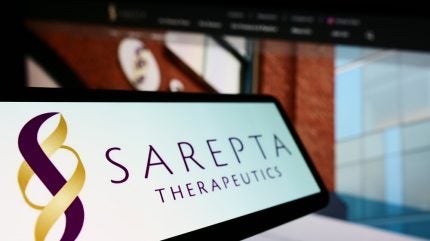

Just a week after Pfizer revealed a Phase III trial failure for its mini-dystrophin gene therapy for Duchenne muscular dystrophy (DMD), Sarepta has announced that it has scored a US label expansion for its DMD gene therapy Elevidys (delandistrogene moxeparvovec-rokl).
As per the 20 June press release, the US Food and Drug Administration (FDA) has expanded Elevidys’ label to include DMD patients with a confirmed mutation in the DMD gene who are at least four years of age. Based on its functional benefits, Elevidys was granted traditional approval for ambulatory patients and accelerated approval for the non-ambulatory population. However, according to the announcement, which drove Sarepta’s shares up 36%, further progression on the approval track hinges on validated clinical benefits from a confirmatory study.

Discover B2B Marketing That Performs
Combine business intelligence and editorial excellence to reach engaged professionals across 36 leading media platforms.
When the therapy’s durability came into question, particularly in a non-ambulatory population, Sarepta CEO Douglas Ingram said in an investor call held on 21 June, that Sarepta has a long-term post-approval commitment to evaluating the long-term durability of Elevidys in children over the next few decades.
To this end, the company is conducting the Phase III ENVISION study (NCT05881408), which is evaluating Elevidys in DMD patients who are non-ambulatory and ambulatory but older. The study, which has fully enrolled its US portion, will serve as post-marketing authentication, and answer the remaining requirements that the FDA has outlined, said Ingram.
Unlike the failed Phase III EMBARK study (NCT05096221) with Elevidys, which evaluated functional motor abilities—as determined using the North Star Ambulatory Assessment (NSAA)—as its primary endpoint, the Phase III ENVISION confirmatory study utilizes Performance of Upper Limb (PUL) 2.0 as its primary endpoint.
Elevidys, which first gained approval in June 2023 for the treatment of DMD patients between the ages of four and five years with a confirmed mutation in the DMD gene, is designed to use a recombinant adeno-associated virus vector serotype 74 (AAV74) to deliver a microdystrophin transgene that encodes a dystrophin protein. Emphasising the success of the trial’s secondary endpoints, Sarepta had submitted an efficacy supplement for the therapy’s biologics license application (BLA), which ultimately received priority review by the FDA in February.

US Tariffs are shifting - will you react or anticipate?
Don’t let policy changes catch you off guard. Stay proactive with real-time data and expert analysis.
By GlobalDataA GlobalData consensus expects Elevidys to pocket $5.7bn in sales in 2029. GlobalData is the parent company of Pharmaceutical Technology.
Pfizer’s fordadistrogene movaparvovec was expected to compete closely with Elevidys before the company announced that no significant improvement in motor function was observed in the treatment group versus the placebo group. Additionally, treatment with the therapy did not demonstrate a significant difference from placebo across the study’s secondary outcomes which included the time it takes for patients to rise from the floor or velocity in a 10-meter run or walk.
Cell & Gene Therapy coverage on Pharmaceutical Technology is supported by Cytiva.
Editorial content is independently produced and follows the highest standards of journalistic integrity. Topic sponsors are not involved in the creation of editorial content.


